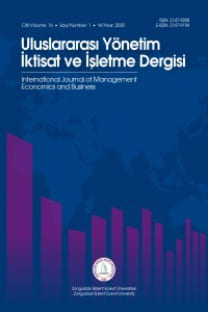TÜRKİYE’DE SEÇİM EKONOMİSİ UYGULAMALARININ GELENEKSEL OPORTÜNİST SEÇİM ÇEVRİMLERİ AÇISINDAN DEĞERLENDİRİLMESİ
Seçim çevrimleri teorisi siyasî ve iktisadî sistemler arasındaki karşılıklı etkileşimi incelemektedir ve 1975 yılında Nordhaus tarafından geliştirilmiştir. Söz konusu çevrimler yeniden seçilmek ve iktidara gelmek isteyen oportünist iktidar tarafından uygulanmaktadır. Bu çalışmada Nordhaus’un seçim çevrimleri Türkiye’de 1950-2006 dönemi içerisinde yapılan genel seçimler ele alınarak incelenmektedir. Elde edilen bulgular incelenen dönem içerisinde seçim çevrimlerinin varlığını kesin olarak destekler nitelikte değildir. 1950-2006 arası yapılan genel seçimlerde kamu harcamaları, para arzı, enflasyon, işsizlik ve büyüme oranı parametrelerinin seçim çevrimlerinin varlığını destekler nitelikte hareket etmediği görülmektedir.
Anahtar Kelimeler:
Seçim Çevrimleri Teorisi, Türkiye
THE TESTING OF THE ELECTORAL ECONOMY APPLICATION IN THE COURSE OF OPPORTUNIST ELECTORAL BUSINESS CYCLE IN TURKEY
The theory of the electoral business cycle EBC analyzes the interaction of political and economic systems. EBC theory has developed by Nordhaus in 1975. The macroeconomic cycle is created by the opportunist government that acts to be reelected and stays in power. This paper reviews Nordhaus’ EBC and evidence about interacting politicoeconomic systems in the theory of Nordhous’ EBC and investigates the existence of Nordhaus’ EBC in the context of the general elections held in Turkey between 1950 and 2006. According to the calculations, the period that is analyzed does not exactly support the existence of EBC. We see that parameters like public expenditure, money supply, inflation, unemployment and growth rate, in the general elections between 1950 and 2006, do not act as supporting the existence of EBC
Keywords:
Electoral Business Cycle, Turkey,
___
- Akalın, Uğur Selçuk (1995), Electoral Business Cycles (EBC): A Case Study for Turkey, Anadolu Matbaası, İstanbul.
- Alesina, Alberto, Gerald D.Cohen ve Nouriel Roubini (1991), “Macroeconomic Policy and Elections in OECD Democracies”, National Bureu of Economic Research Working Papers Series, Working Paper No: 3830.
- Alesina, Alberto ve Nouriel Roubini (1992), “Political Cycles in OECD Economies”, The Review of Economic Studies, No. 59, pp. 663-88.
- Alesina, Alberto, Gerald D.Cohen ve Nouriel Roubini (1993), “Electoral Business Cycles in Industrial Democracies”, European Journal of Political Economy, No. 9, pp. 1-24.
- Alesina, Alberto, Nouriel Roubini ve Gerald D.Cohen (1997), Political Cycles and the Macroeconomy, London: The MIT Press.
- Carlsen, Fredric ve Elin F.Pedersen (1999), “Rational Partizan Theory: Evidence for Seven OECD Economies”, Economics and Politics, Vol. 11, pp. 13-32.
- Drazen, Allan (2000a), Political Economy in Macroeconomics, New Jersey: Princeton University Press
- Drazen, Allan (2000b), “The Political Business Cycle After 25 Years, University”, National Bureu of Economic Research Working Papers Series.
- Eren, Ercan ve Melike Bildirici (1999), “Siyasal Konjonktür Dalgaları ve Türkiye’de Seçmen Davranışları”, İktisat İşletme ve Finans, Sayı 163, ss. 27-39.
- Hibbs, Douglas A.(1986), “Political Parties and Macroeconomic Policies and Outcomes in the United States”, The American Economic Review, Vol. 76, No. 2, pp.66-70.
- Lewis-Beck, Michael S. (1988), Economics and Elections: The Major Western Democracies, Ann Arbor: University of Michagen Press.
- Lindback, Asar (1976), “Stabilization Policy in Open Economes with Endegenous Politicians”, American Economic Association, Richard T.Ely Lecture, Vol. 66, No. 2.
- Macrea, Duncan C.(1977), “A Political Model of Business Cycle”, The Journal of Political Economy, Vol. 85, No. 2, pp. 239-63.
- McCallum, Bennett T.(1978), “The Political Business Cycle: An Ampirical Test”, Southern Economic Journal, Vol. 43 No. 3, pp. 504-515.
- Nordhaus, William D.(1975), “The Political Business Cycle”, Review of Economic Studies, Vol. 42, No. 2, pp. 169-190.
- Paldam, Martin (1979), “Is There an Electoral Cycle? A Comparative Study of National Accounts”, The Scandinavian Journal of Economics, Vol. 81, No. 2, pp. 323-342.
- Schuknecht, Ludger (1996), “Political Business Cycles and Fiscal Policies in Developing Countries”, Kyklos, Vol: 49, pp. 155-170.
- Schultz, Kenneth A.(1995), “The Politics of the Political Business Cycle”, British Journal of Political Science, Vol. 25, No. 1, pp. 79-99.
- ISSN: 2147-9208
- Başlangıç: 2005
- Yayıncı: Zonguldak Bülent Ecevit Üniversitesi
Sayıdaki Diğer Makaleler
KİT’LERDE ÖZELLEŞTİRME SONRASI YENİDEN YAPILANMA: ÇAYCUMA SEKA ÖRNEK UYGULAMASI
TÜRK EMEKLİLİK FONLARININ PERFORMANS ÖLÇÜMÜNDE REGRESYON ANALİZİNİN KULLANILMASI
Turhan KORKMAZ, Hasan UYGURTÜRK
Akif TABAK, Mustafa POLAT, Mustafa POLAT
TÜRKİYE’DE KAYITDIŞI EKONOMİ VE BÜYÜME İLİŞKİSİ
Gülsüm AKALIN, Ferdi KESİKOĞLU
TERSİNE MORTGAGE VE TERSİNE MORTGAGE PİYASASINDA RİSK YÖNETİMİ
EREĞLİ KÖMÜR HAVZASINDA BAHRİYE NEZARETİ DÖNEMİNDE MADENLER VE MADENCİLER 1865-1908
